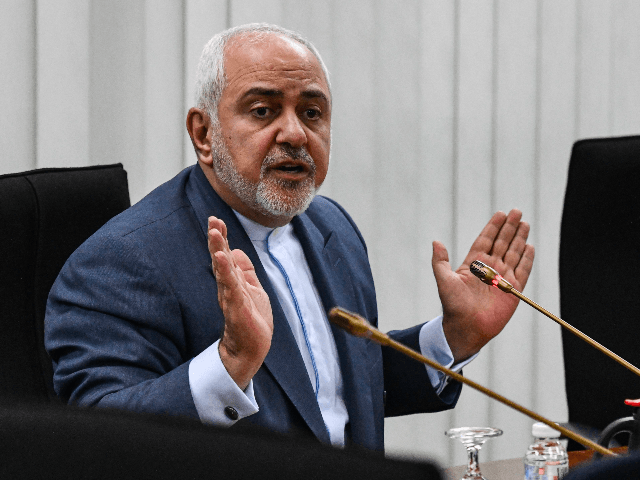Iran’s Foreign Minister Mohammad Javad Zarif complained executed terrorist Qasem Soleimani was a hindrance to his job and that the Russian government actively sabotaged attempts at diplomacy with America in leaked remarks published Sunday.
The Iranian Foreign Ministry confirmed the authenticity of the remarks Monday but insisted they were taken “out of context” to make it appear Zarif was attacking the late Soleimani.
Qasem Soleimani was the head of the Quds Force, the wing of the Iranian Islamic Revolutionary Guard Corps (IRGC) tasked with foreign terrorist operations. The IRGC is a U.S.-designated terrorist organization. A U.S. military operation then-President Donald Trump ordered eliminated Soleimani from the battlefield in January 2020 in Baghdad. Soleimani was in Baghdad to meet the head of the Hezbollah Brigades, Abu Mahdi al-Muhandis, also killed in the same U.S. drone strike. The Hezbollah Brigades are a terrorist organization that operates as part of the Popular Mobilization Forces (PMF), which became a formal wing of the Iraqi military during the war to defeat the Islamic State “caliphate.”
Following his execution, Trump described Soleimani as “the Iranian Regime’s most ruthless butcher, a monster who murdered or wounded thousands of American service members in Iraq.”
American military leaders believe Soleimani was responsible for hundreds of American deaths and injuries, as he pioneered the use of improvised explosive devices (IEDs) to cause loss of limbs and dismemberment during the Iraq War. Soleimani also spearheaded Iran’s involvement in the Syrian Civil War, where it continues to support dictator Bashar al-Assad, and played a major role in diplomacy with socialist Venezuela. Latin American political experts believe Soleimani was in charge of all diplomacy in the region, a clear breach into Zarif’s portfolio.
Following Trump’s execution order, Iran elevated Soleimani to martyr status, organizing mass events in his honor, decorating the streets of the capital with his face, and rebranding him as a poet and family man. Allied nations like Venezuela and Russia also held memorials condemning the military operation against him as a human rights violation.
Zarif’s comments are the first that appear to question Soleimani’s leadership and are particularly striking given that they are dated after Soleimani’s death.
In the comments, reportedly made in a conversation with Iranian journalist Saeed Laylaz — a friendly journalist to Zarif — the foreign minister reportedly complained he was forced repeatedly to “sacrifice diplomacy for the IRGC’s operations” and that he could not adequately do his job as a diplomat because Soleimani would usurp his power. While Zarif said his bosses regularly forced him to yield to Soleimani’s demands on foreign policy, he reportedly told Laylaz, “I have never been able to ask Soleimani to do something that would serve my diplomatic moves.”
According to leaked excerpts of the interview, Zarif directly accused Soleimani of attempting to sabotage the Joint Comprehensive Plan of Action (JCPOA), known commonly as the 2015 Iran nuclear deal, traveling to Russia to conduct rogue diplomacy to encourage the country to damage attempts to secure the agreement. Russia, a signatory to the JCPOA, repeatedly tried to ensure it would not be signed, according to Zarif, thanks to Soleimani’s interventions, demanding Zarif adopt a “rude and non-diplomatic language” with his Russian counterparts.
Zarif also reportedly complained that he had “nil” influence in actually determining Iran’s foreign policy despite being the nation’s foreign minister and that, since the Iranian people preferred military leaders to diplomats, he had less national influence that he preferred to have.
The Iranian Foreign Ministry, which Zarif runs, confirmed the leaked conversation occurred. Spokesman Saeed Khatibzadeh repeatedly noted Zarif did not believe he was in an interview, but rather an off-the-record conversation, and that the leaks had been “illegally” published and taken out of context.
The chat “was by no means an interview from the beginning, nor was it supposed to be an interview… it was part of a routine and confidential dialogue that takes place within the administration,” Khatibzadeh said. The conversation reportedly lasted seven hours.
Now that some of the interview is public, Khatibzadeh urged the publication of a full transcript of the conversation: “What Zarif has said should be seen as a whole and not cherry-picked.”
Iranian state news agencies also published remarks by Zarif on Monday praising Soleimani and al-Muhandis as martyrs. Zarif is currently on a diplomatic visit to Baghdad, where the U.S. drone strike against them occurred. PressTV, the Mehr News Agency, and the Fars News Agency all devoted space on Monday to Zarif praising Soleimani, in addition to the nominally private Tasnim News Agency.
“Martyrs Qassem Soleimani and Abu Mahdi Al-Muhandis are the symbols of resistance for the two countries,” Zarif said upon landing in the Iraqi capital. “The people of Iraq and Iran fought and won against common enemies, from Saddam to [the Islamic State].”

COMMENTS
Please let us know if you're having issues with commenting.